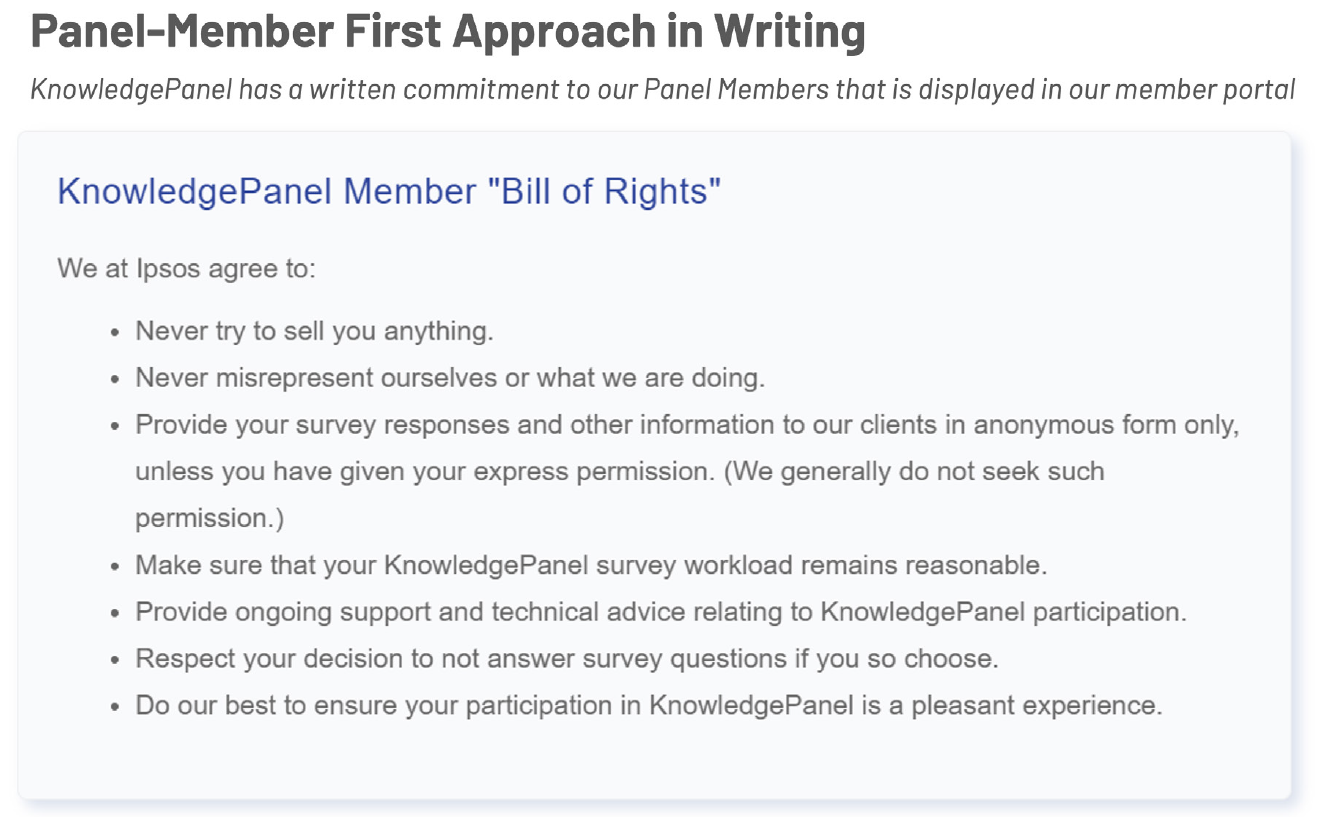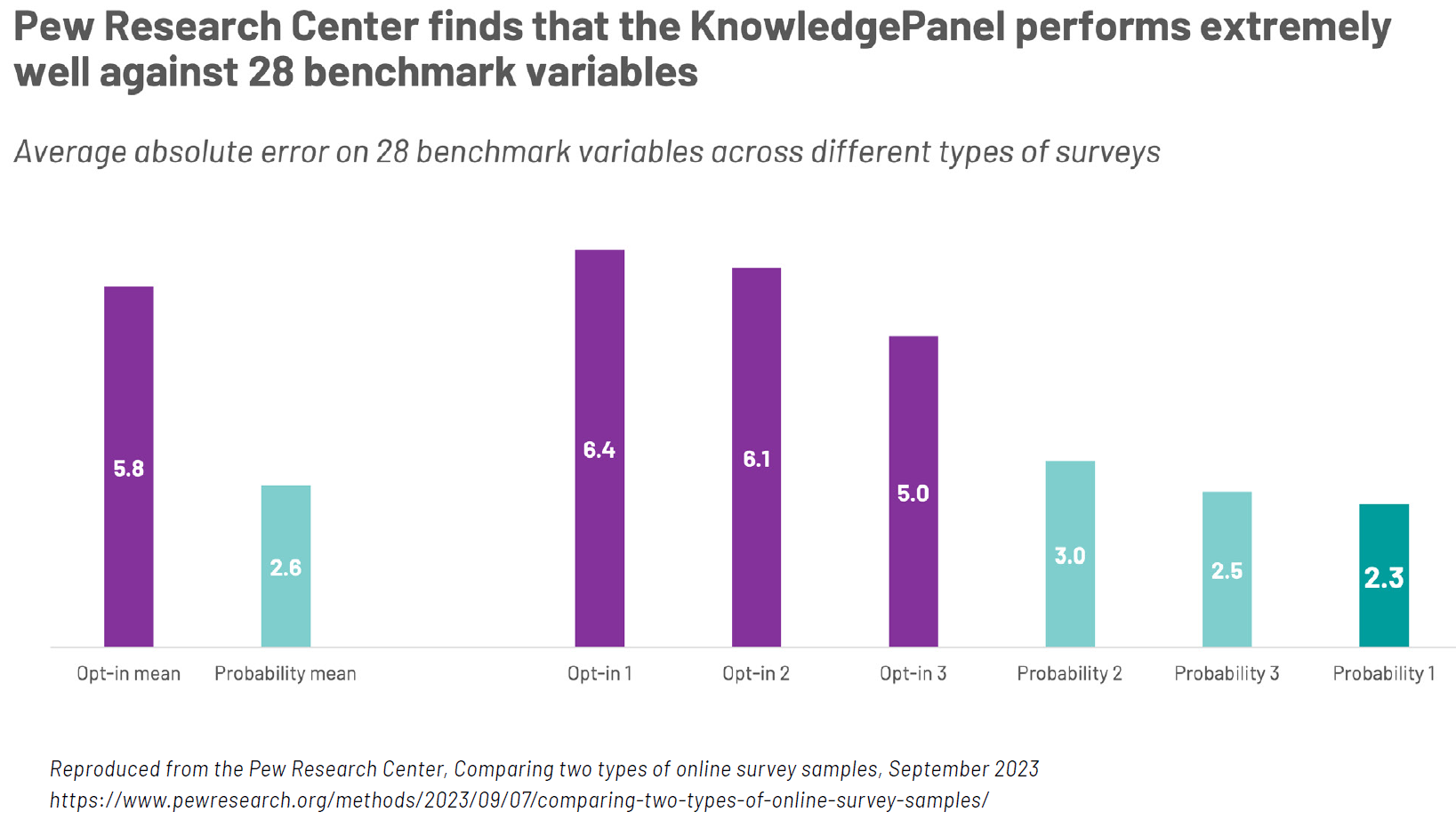Why panel-member first is good for research and business
How do you conduct high-quality, representative research today? That’s a central question and concern researchers and businesses are contending with.
Yet, Ipsos’ KnowledgePanel had an incredibly successful year in 2023. Completion rates – that is, how many people start and finish surveys – are up 7 percentage points across the board, even rising 9 points for harder-to-reach subgroups. Fewer people are leaving the KnowledgePanel, too, with attrition rates down for all panelists, but especially among hard-to-reach groups.
So, what’s behind KnowledgePanel’s success amid the wider structural challenges the survey research industry faces?
The KnowledgePanel employs a highly effective approach to online probability research that emphasizes the experience and life cycle of panel members, something we call the Panel-Member First Approach. Centering the people behind the data – the participants – makes research more representative, accurate, and is the most cost-effective approach to conducting research. This “respondent-centric” approach to cross-sectional survey respondents or participants is common within the industry. However, Ipsos’ KnowledgePanel takes this a step further.
By prioritizing the experiences of panel members and implementing strategies, like using a conversational tone in communication, optimizing surveys for mobile use, creating and using a panelist Bill of Rights, Ipsos is centering the person behind the number, ensuring that our data is high-quality, reliable, and maximizing the value of the research clients pay for.
Panel-Member First Approach: Treat Panelists How You’d Want to Be Treated
Ipsos uses the Golden Rule when thinking about managing panelists. The Golden Rule – treat others how you'd like to be treated – governs what Ipsos asks of panelists, and how Ipsos compensates panelists for their time.
First, in managing the KnowledegePanel, Ipsos limits response burden for panelists. Response burden is the consideration of how much is being asked of a respondent or panelist when taking a survey.
Being mindful of the number of surveys respondents are asked to take is a crucial way Ipsos limits response burden for panelists. This ensures that panelists are engaged in the surveys they do take and are open to taking surveys into the future. Maintaining engaged panelists keeps the cost of the panel down for clients.
Ipsos also considers the panelists’ experience when designing surveys. The KnowledgePanel optimizes surveys for any device, but especially mobile. Optimizing for mobile is especially helpful for engaging hard to reach groups, like younger Americans.
Additionally, Ipsos avoids creating excessively long surveys and compensates respondents for their participation. Rewarding panelists for their participation by increasing points for underrepresented groups and offering non-contingent spot bonuses helps to ensure the right mix of voices are being heard, ultimately making surveys more representative and accurate. To that end, KnowledgePanel also provides additional encouragement and pointers for redeeming points for rewards, so panelists are engaged and taking surveys. Ipsos wants respondents to redeem their rewards so they will continue to respond to survey invitations.
Not Losing Voices: Effective Communication Avoids Panel Attrition
Ipsos maintains its Panel-Member First design by preventing attrition on the KnowledgePanel. A crucial way that Ipsos does this is by writing and demonstrating our values through our KnowledgePanel Member Bill of Rights, where Ipsos tells panelists what they can expect from being a part of the KnowledgePanel and what rights they are afforded. For example, Ipsos provides assurance that we will never try to sell panelists anything, misrepresent ourselves or what we are doing, keep responses anonymous unless given explicit permission to do otherwise, and make sure workload is reasonable, among other rights.

Additionally, when and how Ipsos communicates with panelists is key to preventing attrition. Shifting to a more causal and conversational tone can be an effective way of communicating with panelists. Following up early in the panel member life cycle in a personalized way also matters. The deepest human need is to be heard and recognized. Talking to panelists with this in mind keeps them engaged.
Ipsos testing also suggests that engaging with new members of the KnowledgePanel prevents attrition, which is important for maintaining, managing, and building the KnowledgePanel in the most cost-efficient, accurate, and reliable way. Every panel member lost is a voice not heard in the research.
Ipsos continuously tests how communication with panelists and other KnowledgePanel features are working to ensure they are accurate, land well with panelists, and adheres to the Panel-Member First Approach. One way the KnowledgePanel does this is through our Instant Poll, where we collect open-ended responses asking panelists if they are enjoying their experience on KnowledgePanel. Aside from collecting data to make informed decisions about the experience, this is also an effective tool because panelists can see that Ipsos wants their input and can feel the immediate impact on their experience.
Taken together, these best practices of communicating openly, clearly, and at strategic points in the life cycle of panelists, respecting panelists’ time and resources when taking a survey, and designing surveys with panelists in mind all add up to producing the most accurate research possible.
Panel-Member First Design Pays Off
This Panel-Member First approach is not just good for panelists, it is good for business and research. A well-managed panel is an accurate and efficient panel.
KnowledgePanel routinely benchmarks against federal point estimates to ensure the panel is performing accurately. For example, during the COVID-19 pandemic, the KnowledgePanel point estimates for COVID vaccination rates were in line with CDC figures. A Harvard assessment of survey performance found that the KnowledgePanel’s was able to capture COVID-19 vaccination rates accurately and effectively during a time of tremendous change for Americans in their attitudes and behaviors, outperforming other larger surveys. The KnowledgePanel is an accurate tool for measuring and capturing what Americans think, feel, and experience.
Similarly, a CDC evaluation of different surveys against their point estimates for COVID-19 vaccination coverage found that the KnowledgePanel omnibus captured similar COVID-19 vaccination rates to the CDC’s estimates, making it one of the most accurate surveys the CDC tested.
Pew Research Center also compared the KnowledgePanel to other probability and non-probability sample sources, comparing absolute error on 28 different benchmark variables. KnowledgePanel performed extremely well, a testament to how consistently KnowledgePanel performs in terms of data accuracy against a wide variety of benchmarks relative other survey vehicles.

What to know about the KnowledgePanel’s Panel-Member First approach
Panel members are the life blood of the KnowledgePanel – without them there is no KnowledgePanel. Intentionally designing and approaching panel members with their experience in mind is crucial to sustaining a precise and cost-effective panel.
- A Panel-Member First approach pays off.
- Treating panelists with respect, being considerate of their time, and designing research with them in mind is key for executing an accurate and cost-effective panel.
- Building and maintaining KnowledgePanel to be a precise and efficient platform for data collection starts with centering panelists: their experiences, their needs, and their considerations when taking surveys.
To learn more, reach out Ipsos Public Affairs to explore ways the KnowledgePanel can meet your research needs.



